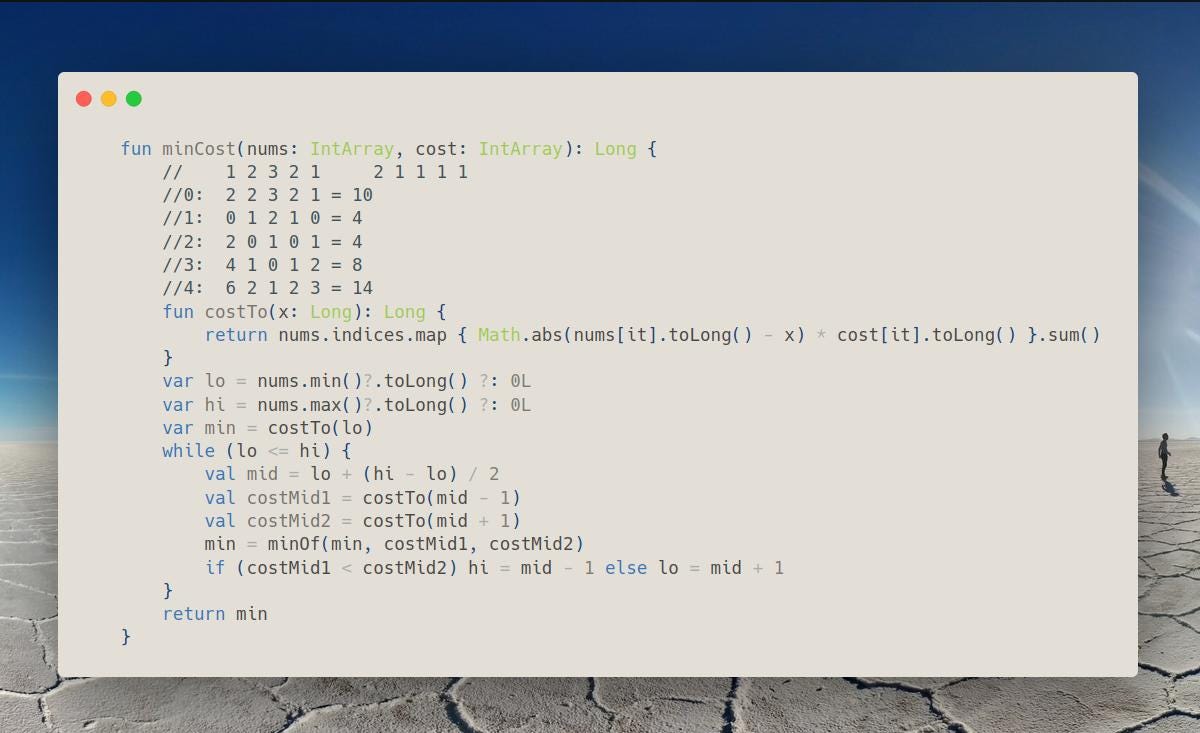# 21.06.2023 [2448. Minimum Cost to Make Array Equal]
Min cost to make all `arr[i]` equal, where each change is `cost[i]`
21.06.2023
2448. Minimum Cost to Make Array Equal hard
blog post
Join me on Telegram
https://t.me/leetcode_daily_unstoppable/252
Problem TLDR
Min cost to make all arr[i] equal, where each change is cost[i]
Intuition
First idea is that at least one element can be unchanged.
Assume, that we want to keep the most costly element unchanged, but this will break on example:
1 2 2 2 2 1 1 1
f(1) = 0 + 1 + 1 + 1 = 3
f(2) = 2 + 0 + 0 + 0 = 2 <-- more optimal
Let’s observe the resulting cost for each number:
// 1 2 3 2 1 2 1 1 1 1
//0: 2 2 3 2 1 = 10
//1: 0 1 2 1 0 = 4
//2: 2 0 1 0 1 = 4
//3: 4 1 0 1 2 = 8
//4: 6 2 1 2 3 = 14
We can see that f(x) have a minimum and is continuous. We can find it with Binary Search, comparing the slope = f(mid + 1) - f(mid - 1). If slope > 0, minimum is on the left.
Approach
For more robust Binary Search:
use inclusive
lo,hialways compute the result
minalways move the borders
lo = mid + 1orhi = mid - 1check the last case
lo == hi
Complexity
Time complexity:
O(nlog(n))Space complexity:
O(1)
Code
fun minCost(nums: IntArray, cost: IntArray): Long {
// 1 2 3 2 1 2 1 1 1 1
//0: 2 2 3 2 1 = 10
//1: 0 1 2 1 0 = 4
//2: 2 0 1 0 1 = 4
//3: 4 1 0 1 2 = 8
//4: 6 2 1 2 3 = 14
fun costTo(x: Long): Long {
return nums.indices.map { Math.abs(nums[it].toLong() - x) * cost[it].toLong() }.sum()
}
var lo = nums.min()?.toLong() ?: 0L
var hi = nums.max()?.toLong() ?: 0L
var min = costTo(lo)
while (lo <= hi) {
val mid = lo + (hi - lo) / 2
val costMid1 = costTo(mid - 1)
val costMid2 = costTo(mid + 1)
min = minOf(min, costMid1, costMid2)
if (costMid1 < costMid2) hi = mid - 1 else lo = mid + 1
}
return min
}


